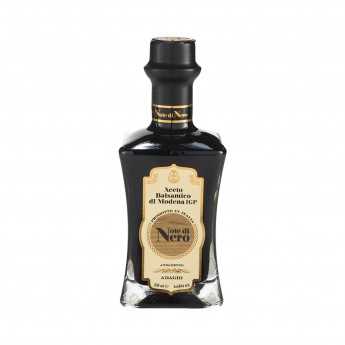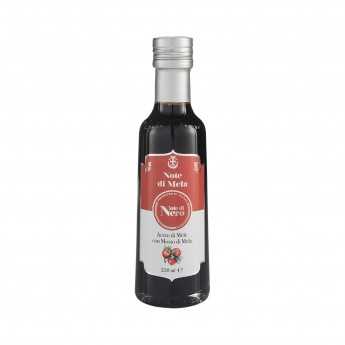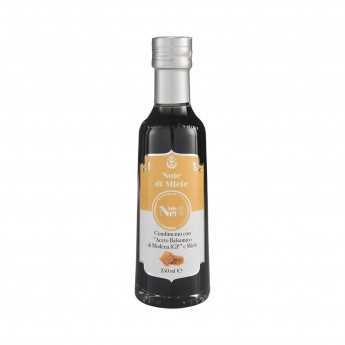FREE SHIPPING FOR ORDERS FROM 149 €
List of products by brand Note Di Nero
Note di Nero is a brand of A.B.C.D. - Aceto Balsamico Condimenti e Dintorni, protagonist in the world of balsamic vinegar production, born from the deep and authentic passion for the symbolic product of a territory, that of Modena, and its culture.
A story of passion and authenticity
Note di Nero is a brand of A.B.C.D. - Aceto Balsamico Condimenti e Dintorni, protagonist in the world of balsamic vinegar production, born from the deep and authentic passion for the symbolic product of a territory, that of Modena, and its culture.
A constantly updated tradition
Note di Nero produces balsamic vinegar using traditional wooden barrels made by master craftsmen and leaving it to mature for a long time, until a first quality product is obtained. Note di Nero takes up the challenge of producing balsamic vinegar by combining the industrial process with observance of the specifications: the result is an excellent product from a gastronomic point of view, made in compliance with the highest hygiene and quality standards. A careful selection of the best raw materials guarantees a genuine and uncompromising product.
A touch of authenticity for each dish
The Note di Nero range of balsamic vinegars and condiments was created to follow and inspire the evolution of tastes, bringing together tradition and modernity. Preserving the spirit of the balsamic vinegar, the products are always adapting to new ways of use, for an inimitable flavor on every occasion.
Balsamic vinegar: the history
Yesterday as today, Note di Nero balsamic vinegar originates from grapes, a cultivation that has been practiced in the Modena area since pre-Roman times, from the cooking of the must and the acetification process. The resulting vinegars have been consumed for centuries by people from all walks of life as condiments, thirst quenchers and medicinal remedies.
The development of the vinegar art knows no interruptions between antiquity and the Renaissance, but it is from the beginning of the 1600s, when the Estense court was established in Modena, that we have news of a vinegar with characteristics of flavor, perfume, color and density similar to those of today's balsamic vinegar. The dukes and patrician families of the city jealously guard the vinegar factories, a real heritage to be handed down where the precious condiment is perfected generation after generation.
The definition "balsamic" appears for the first time in a document from 1747, but its fame has already spread for some time, given that Modena vinegar is in demand by kings and emperors of Europe. In the following century, scientists and scholars spread their knowledge, decreeing its success.
A long story that Note di Nero continues every day in the wake of tradition.
The wooden barrels
After cooking the must and bacterial fermentation, Note di Nero Balsamic Vinegar of Modena slowly matures in artfully crafted wooden barrels. Oak, locust, ash, chestnut, cherry and mulberry: each of these woods gives the balsamic vinegar a characteristic aroma and a particular structure.
A natural process that is only successful in the particular climate of the Modena area, with hot and humid summers and harsh winters. Every winter, the new must is placed in the first barrel, while the contents of the following are gradually decanted into the next barrel to replace the part evaporated during the summer. It is only after completing the maturation in contact with all the woods that the product obtained from the last barrel becomes Note di Nero Balsamic Vinegar of Modena.
Traditional and IGP
Note di Nero produces Balsamic Vinegar of Modena PGI (Protected Geographical Indication) and Traditional Balsamic Vinegar of Modena PDO (Protected Designation of Origin) in compliance with the regulations.
For the Balsamic Vinegar of Modena PGI, Note di Nero uses only cooked must and first choice wine vinegar, leaving the product to mature in oak barrels for no less than 60 days.
Note di Nero Traditional Balsamic Vinegar of Modena PDO is made in compliance with a specification that provides for a long cooking of the must, made with grapes from vineyards selected only in the province of Modena, and aging in wooden barrels, with subsequent decanting, for no less than 12 years.



 Italiano
Italiano Deutsch
Deutsch


